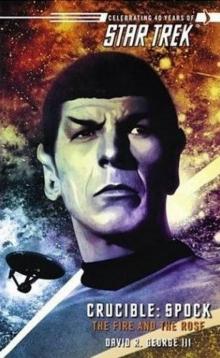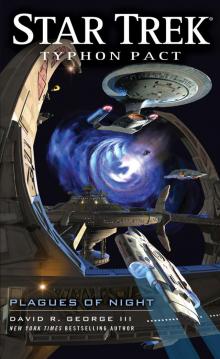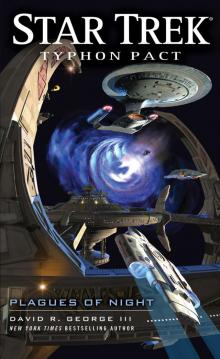- Home
- David R. George III
Sacraments of Fire Page 2
Sacraments of Fire Read online
Page 2
She gazed down at her body and saw that she had at last been freed from her final prison. Still, to be absolutely sure, she reached one hand to her face and felt the bridge of her nose, up to the curled depression in the center of her forehead, then along her jaw and around her eyes. Her Bajoran features had gone, replaced by those of her Cardassian heritage.
Not replaced by, Ghemor thought. Restored to.
For she had been born and raised a proud daughter of Cardassia. In Ghemor’s youth, her mother, Kaleen, taught at Central University as a first-tier inquisitor, and her father, Tekeny, served as a legate for Central Command. She grew up in privilege, a wide-eyed and patriotic citizen of the storied Cardassian Union, who saw and experienced the best her people had to offer.
Ghemor had gravitated to the arts, eventually moving to Pra Menkar to continue her studies there. While away at school, a man named Corbin Entek approached her and attempted to recruit her into the Obsidian Order, the Union’s elite intelligence agency. Flattered—and perhaps a bit frightened—by the overture, but uninterested in such work, she demurred. But when members of the Resistance killed Ataan Rhukal, her betrothed, during his military tour on Bajor, she reconsidered. Ultimately, she joined the Order, then volunteered for a deep-cover assignment to infiltrate the Bajoran underground. Mind-control experts buried Ghemor’s own personal history beneath implanted memories of a life lived as a Bajoran, and surgeons altered her appearance so that she looked precisely like one of the members of the Resistance cell responsible for the death of her beloved. More than just the murder of her intended spouse, the Shakaar cell had perpetrated many other heinous acts of terrorism against the Cardassians, who stayed on Bajor seeking only to elevate the lives of the backward Bajorans. The Resistance had to be stopped, and to that end, Iliana Ghemor became Kira Nerys.
She had become Kira, but she had not been able to take her place—at least, not in the way she had envisioned. Before deploying to her mission, she ended up in the custody of Skrain Dukat, a gul in the Cardassian military who functioned as the prefect of Bajor. He secretly imprisoned her, keeping her locked away for more than five thousand days as his personal plaything, beating her and raping her according to his depraved whims.
Five thousand days, Ghemor thought, not without anger. She had been held in sexual slavery for virtually all of her time as an adult, and nearly half of her entire life. And all because of Kira Nerys. Had the terrorists not killed Ataan, or had Kira not so closely resembled Ghemor, Iliana would have remained on Cardassia, doubtless living a fulfilling existence as a wife, mother, and artist.
Ghemor raised her head and gazed skyward. A vast array of stars stared coldly back at her. She tried to pick out the pinpoint of light that had long ago burned warmly above the comfortable days of her childhood, but she did not recognize any constellations. She searched in vain for the Long and Lonely Sojourn, for the Flower of Knowledge, for the Bitter Children, but the patterns she could see looked completely unfamiliar to her.
No, not completely unfamiliar, she realized. She picked out an alignment of five stars that Shing-kur had informed her about after their prison break, during their time on Harkoum. Like the lone spark in the wilderness that grows into an all-consuming inferno, the first inkling of a new course of action lit in Ghemor’s mind.
In the six hundred days since the end of her captivity in the high-security prison on the Cardassian moon of Letau, she had devised several goals, along with plans to accomplish them. At the end of Cardassia’s war with the Federation and its allies, an attack on Letau had left her detention cell damaged. She fled with four other prisoners, including Shing-kur, a Kressari woman who became her staunchest compatriot. Together, they plotted Ghemor’s revenge on Kira Nerys—and not just on the Kira Nerys who had denied her a satisfying existence, but on all versions of Kira Nerys in all universes.
Ghemor had employed mind control to compel a Jem’Hadar soldier to attack Kira, although the subsequent implant of an artificial heart had prevented the Bajoran’s death. Ghemor dispatched Kira’s counterpart, known as the Intendant, in a parallel universe, before deciding that she would take a page out of Bajoran religious history and fulfill Trakor’s First Prophecy, becoming the Emissary of the Prophets in that alternate reality.
Instead, Kira joined forces with Ghemor’s own doppelgänger to thwart her efforts, and the three of them had ended up together inside the Bajoran wormhole. They all came face-to-face with the Prophets—or at least with the visages they chose to assume: Ghemor’s mother and father; Kira’s parents; Ataan, whom Ghemor had loved; Entek, who had brought her into the Obsidian Order and then trained her; Shakaar Edon and Dakahna Vas, two of Kira’s coconspirators in her Resistance cell; and the vile, contemptible Dukat. The Prophets declared Ghemor the Fire, and Ghemor demanded of them that they give her back her life.
And the aliens who resided in the wormhole had done just that. They unspooled before her all the moments of her existence, laying bare the brutal, tortuous path she had traveled—both as Iliana Ghemor and as Kira Nerys—to arrive at that place and time. They showed her all that she had been, all that she had done, all that she had felt. In the end, they also allowed her to glimpse the path forward.
Ghemor lowered her head from the endless firmament above and regarded the alien kneeling before her. “I am the Fire,” she said again, in quieter—though no less commanding—tones. “Who are you?”
The kneeling alien looked at her with the sort of awe Ghemor had imagined the Bajorans in the alternate universe would when she emerged from the Celestial Temple as their Emissary. “I . . . we . . . are the Ascendants,” he said, raising his arms wide, plainly to include all those present. He sounded as though he sang rather than spoke. “We here are the Archquesters, the leaders of the knights in our Orders.”
The leaders, Ghemor thought, pleased that the few hundred aliens arrayed about her did not constitute their entire force. “Rise,” she told the genuflecting Archquester. She watched him do as she’d ordered. At his full height, he towered over her. It looked as though he wore a close-fitting environmental suit, almost like a silvery liquid coating. But because Ghemor saw no helmet or mask, and no obvious place where one could attach, she guessed that the aliens—the Ascendants—possessed a naturally occurring armor shell. They also had large golden eyes, with radial striations around their outer edges.
Ghemor stepped forward and peered upward at the Ascendant. “Who are you?”
“I am Votiq,” he said. “I am the Grand Archquester.”
“And why are you here?”
“We have come together to debate events that some see as signs of the End Time,” Votiq said. “At least, that is what we thought. It now becomes clear that we are actually here to greet you, as presaged by scripture, and to follow the Fire on the Path to the Final Ascension.”
In just the few words he spoke, Votiq revealed his religious zealotry. Ghemor readily heard the emphasis and importance he gave to phrases like End Time, the Fire, and Final Ascension. She also understood that he believed—and perhaps that all the Ascendants there believed—that she had come to lead them. Ghemor believed that, too. The wormhole aliens had declared her the Fire, and then had sent her to a race apparently awaiting the Fire—a race whose leaders stood together with an Orb of the Prophets in their midst. All of that seemed less like the result of chance and more like the mark of a direct connection.
“What is the Final Ascension?” Ghemor asked. Votiq inclined his head slightly to one side—almost like a pet trying to understand the words of its master, Ghemor thought. She knew that she should proceed with caution in seeking out the information she needed. “What do you know about the Final Ascension?” she amended, implying her own knowledge on the subject.
“It will occur after we locate the Fortress of the True,” Votiq said. “The Ascendants who reach our divine destination will stand before the Unnameable. The gods will judge us, and burn
us, and join with those of us they find worthy.”
His words veritably dripped with his belief. The Fortress of the True. The Unnameable. Ghemor wondered if those terms equated with the Celestial Temple and the Prophets. She didn’t know, but the pieces all seemed to fit. She also knew that it didn’t matter. The Celestial Temple might be the Fortress of the True, but if not, then it could certainly stand in credibly for it.
Ghemor stepped back from Votiq and reached around for the pyramid-shaped container holding the Orb of the Prophets. She lifted it, hoping it would not weigh too much for her to bear, but it actually felt lighter than she’d expected, as though it held nothing within it. She squatted and set it down on the sleek black ground, then climbed atop the empty plinth.
Ghemor turned in place, looking out at the rings of Ascendants. Even simply standing there, they appeared an impressive force. She couldn’t know for sure at that point, but she would find out. She hoped that the Prophets would not have sent her there if not to fulfill her destiny, and having a formidable army of religious crusaders following her might well allow that to happen.
“I have come here from the Fortress of the True,” she called out. “I have come to lead you there.”
A great trill rose up around Ghemor as many of the Ascendants broke their silence. She watched them closely, searching for any signs of opposition. She saw none. Some Archquesters bowed in her direction and some dropped to their knees, prostrating themselves before her. She knew that they would follow her. At her behest, they would summon the rest of the Ascendants, and once their armada had formed its ranks, Ghemor would lead them not just to the Celestial Temple, but through it, and into the Alpha Quadrant, where she would employ them as the blunt instrument of her vengeance. They would attack Deep Space 9, where she would finally conquer the author of her tragic life. Iliana Ghemor would see the space station in flames, and Kira Nerys along with it.
She threw her fists into the air above her head. “I am the Fire!”
I
Smoke
1
Captain Ro Laren stood in the four-pad transporter room adjoining the Hub, the disc-shaped command complex that crowned Deep Space 9. She stared at the stranger who had just materialized there. Ro’s chief engineer, Miles O’Brien, hadn’t beamed the man onto DS9, though, but had transported aboard an hourglass-shaped object that glowed green and looked like an Orb of the Prophets. It exited from the wormhole moments earlier, and sensors detected a life-form within it. Once brought aboard, it vanished in a brilliant flash of white light, leaving a Bajoran man standing in its place. “Who are you?” Ro asked.
“My name,” the man said, “is Altek Dans.”
The name meant nothing to Ro. She glanced to one side, to her security chief, Lieutenant Commander Jefferson Blackmer. He carried a phaser in one hand, a precaution the captain had ordered before allowing the Orb on board. Ro nodded her head toward the room’s lone freestanding console, where O’Brien had stationed himself to operate the transporter. Following the captain’s unspoken command, Blackmer quickly crossed the compartment. After handing his weapon off to the chief engineer, he took a position beside him and began working a secondary panel on the console.
As she heard the feedback chirps of the security chief’s efforts, Ro introduced herself to the stranger, giving her rank and name. She saw no hint of recognition in the man’s expression. When he did not respond to her, she scrutinized him. The ridges at the top of his nose identified him as Bajoran, but such characteristics could be faked, and so she would have him examined in Sector General for confirmation. Perhaps a head taller than Ro, he had dark hair, straight and cut short, and dark eyes. A bronze complexion showcased his chiseled features, while several days’ growth of beard did nearly as much to hide them. He wore grimy, disheveled clothes—heavy black pants and a black, long-sleeved sweater—and well-worn hiking boots. Dirt covered his hands and smudged his face. More than anything, he looked as though he had lived at least the prior few days outdoors.
“Are you sky?” the man asked abruptly. He spoke Bajoran, but with a peculiar patois that Ro couldn’t place. It raised her suspicions, thinking that perhaps he had learned the language offworld.
Offworld, like on Ab-Tzenketh, Ro thought, not without bitterness. Five days earlier, at a ceremony intended to inaugurate the new starbase and to help sow peace in the region, the captain and most of her crew had witnessed the ruthless assassination of Federation President Nanietta Bacco. Initially, a Bajoran national—Enkar Sirsy, chief of staff for the first minister—had been implicated in the monstrous crime, but just the day before, additional evidence had cleared her and pointed instead to Tzenkethi involvement.
“Am I . . . sky, did you ask?” The question made no sense, and Ro wondered if she’d correctly understood the oddly accented words.
The man looked away from her and around the transporter room. He wore a mien of confusion, perhaps even of disorientation, and he began to exhibit signs of agitation. When he eventually peered back at the captain, he blurted, “I’m not ice.” The avowal seemed as absurd to Ro as his question.
Suddenly, the man started forward, toward the two steps that led down from the front of the raised platform. Ro quickly raised her hand, palm out. “I wouldn’t,” she said sharply, and the man stopped at once. “We’ve erected a level-one containment field around the transporter.”
“I don’t . . . I don’t know what that means,” the man said.
“It means that there’s a force field surrounding the platform you’re standing on,” Ro said.
The man shook his head as though confused. “Where am I?” he asked. “How did you bring me here?”
Before Ro could reply, Blackmer spoke up from the console. “Captain, I can’t find any record, in any of our databases, of an Altek Dans.”
“Well, Mister ‘Altek’?” Ro said. “Would you care to tell us your real name, as well as where you’re from and what you’re doing here?” The captain could not help thinking that the wormhole connected to the Gamma Quadrant—home to the Dominion, an interstellar power that had waged a long and brutal war against the Federation and other Alpha Quadrant nations. Occurring so soon after the assassination, and only a day before Deep Space 9’s ten thousand civilian residents would begin to arrive, the unexpected appearance of an unknown individual on the starbase gave Ro serious concerns.
“I’ve told you my name,” the man said. “I’m from Joradell, and I have no idea how or why you’ve brought me here—or even where here is.”
“Is Joradell a planet in the Gamma Quadrant?” Ro asked. “Is it part of the Dominion?” The investigation into the murder of President Bacco had not uncovered any connection with the Founders, but the captain wouldn’t exclude any possibilities, especially regarding present or historic enemies of the Federation.
“Joradell isn’t a planet,” the man said. “It’s an Aleiran city on Bajor.”
“I was born and raised on Bajor, and I’ve never heard of any such city,” Ro said. “Why don’t you drop the pretense and—”
“Captain!” Blackmer called out, racing back up beside her. Ro saw that he had taken his phaser back from O’Brien. “Automatic sensors didn’t issue any alerts, but I performed a manual scan. It revealed that the man is carrying a projectile weapon.”
The information distressed Ro. President Bacco had been killed with such a weapon. “Chief,” she asked O’Brien, “can you disarm him?”
“Isolating the weapon now,” the engineer said, his thick fingers marching across the transporter console.
“Beam it into the bunker,” Ro ordered. Officially designated the Explosive Device Containment Chamber, the compartment, located in an outer section at the base of Deep Space 9’s main sphere, provided a secure environment into which potentially dangerous objects could be placed. Physically reinforced bulkheads and triply redundant containment fields separated the chamber
from the rest of the starbase, and a sophisticated transporter system could automatically redirect the force of any detonations out into the vacuum of space.
“Aye, sir,” O’Brien said. As he operated his controls, Ro heard a muffled, high-pitched hum. The man, obviously hearing it too, seemed to concentrate for a few moments on the sound, then quickly reached to the back of his hip—to where, Ro assumed, he carried his weapon. His hand came away empty.
Ro paced forward until she stood just in front of the steps leading up to the transporter platform. On her face, she could feel the tingle of the charged air between her and the unseen containment field. “Mister Altek, or whatever your actual name is, I am placing you under arrest for illegally bringing a weapon onto this starbase. You will be detained pending our investigation and the filing of formal charges against you.”
“Starbase?” the man said. “I don’t . . . I didn’t—”
“Chief,” Ro said, “transport our guest to the stockade.”
“Aye.” In just seconds, strands of white light formed above the platform, joined an instant later by equally bright motes. As they expanded to envelop the man, his face grew panicked. After a moment, he faded from view.
Ro turned to face her security chief. “I want him under constant surveillance.”
“I understand, Captain.”
The entire incident troubled Ro, but something more specific gnawed at her. “Why didn’t the firearm show up on automated scans?” she wanted to know. After a projectile weapon had been employed in the assassination of the Federation president, the captain, in consultation with Blackmer, had decided to order the sensor protocols within the starbase modified to include monitoring for such arms, despite their antiquation and rare usage.
“I need to verify this,” the security chief said, “but I believe it’s because our visitor’s weapon was far more primitive than . . .” He didn’t finish his statement, but he didn’t need to; Ro understood that he meant to compare the firearm just brought aboard to the one that had ended President Bacco’s life.

 Serpents Among the Ruins
Serpents Among the Ruins The Fire and the Rose
The Fire and the Rose Star Trek: Typhon Pact 06: Plagues of Night
Star Trek: Typhon Pact 06: Plagues of Night Star Trek: The Lost Era - 08 - 2319 - One Constant Star
Star Trek: The Lost Era - 08 - 2319 - One Constant Star Star Trek: Deep Space Nine: Ascendance
Star Trek: Deep Space Nine: Ascendance Star Trek: TOS: Allegiance in Exile
Star Trek: TOS: Allegiance in Exile Crucible: Kirk
Crucible: Kirk Crucible: McCoy
Crucible: McCoy The Long Mirage
The Long Mirage Original Sin
Original Sin Star Trek: Typhon Pact: Plagues of Night
Star Trek: Typhon Pact: Plagues of Night Allegiance in Exile
Allegiance in Exile Sacraments of Fire
Sacraments of Fire Star Trek: Typhon Pact: Rough Beasts of Empire
Star Trek: Typhon Pact: Rough Beasts of Empire Star Trek: The Fall: Revelation and Dust
Star Trek: The Fall: Revelation and Dust